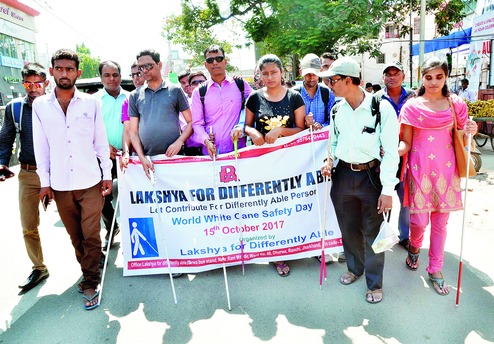
Ranchi: Burdened by GST on disabled-assistance devices, visually challenged persons in Ranchi and Jamshedpur took out a rally to mark White Cane Safety Day on Sunday.
First held in the US in 1964, White Cane Safety Day is a global event to honour the device that gives visually impaired pedestrians right of way. Over the years, the white cane has become a powerful symbol of mobility for the blind.
A white cane with sensors cost around Rs 500 pre-GST. With 5 per cent GST imposed on all assistance aids, the price has gone up to Rs 25.
"The White Cane Safety Day rally is being held for the second consecutive year in Ranchi for awareness on problems faced by visually challenged," said Arun Kumar Singh, president of Lakshya for Differently Able.
In Ranchi, 60 visually challenged persons took part in the 1km rally between Big Bazaar and Sainik Market on Main Road, in which mayor Asha Lakra and her deputy Sanjeev Vijayvargiya walked blindfolded.
In Jamshedpur, 80 visually impaired persons led by National Association for the Blind (NAB) Jharkhand secretary, Tata Steel executive Atul Sahay and East Singhbhum civil surgeon Dr M. Prasad walked for over 2.5 km from NAB office in Baradwari to the JN Tata statue in Jubilee Park.
"There are nearly 2 lakh visually challenged in Jharkhand. Over 90 per cent are poor and the 5 per cent GST on aids hits them hard. Earlier, these goods were exempt from levy," Sahay said, adding this was the first such rally held in Jamshedpur.
White cane apart, other aids for the visually challenged such as DAISY players (talking books) cost between Rs 8,500 and Rs 10,000 and Braille ones anywhere between Rs 350 and Rs 400.
Ranchi deputy mayor Vijayvargiya appealed to the society to think about the visually challenged. "Traffic police and people should know about the white cane. Also, RMC has decided any new public building must give access (ramps, lifts, Braille signboards) to the disabled," he said.
State disability commissioner Satish Chandra at the Ranchi rally spoke on the need for the disabled to access public buildings. "Right now, only 20 per cent of public buildings in Jharkhand give access to the disabled," he said.










